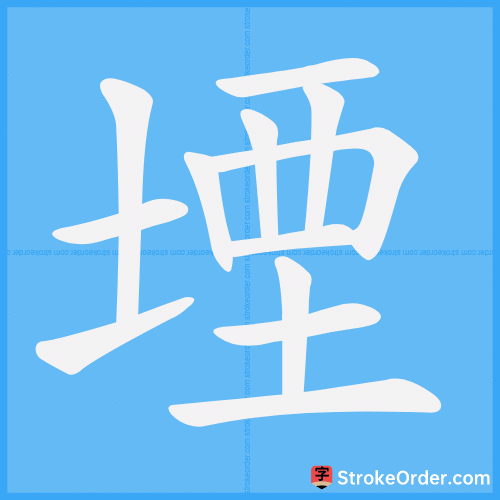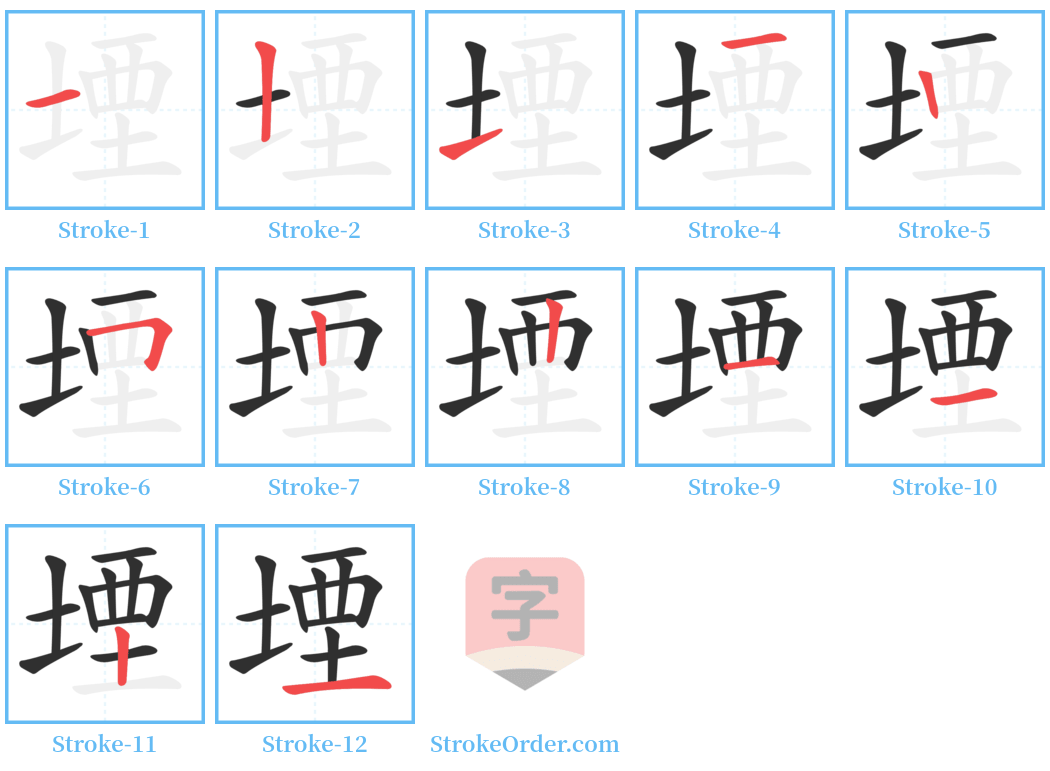堙 Stroke Order
Animated Stroke Order of 堙

Stroke Order Diagrams for 堙

Step-by-Step Handwriting Guide for 堙

Learn to Write Chinese Characters with Video Tutorials
Watch the video of writing the Chinese character "堙", learn the correct stroke order (笔顺) of the character "堙", and master the standard way of writing the character "堙".

Free Printable Handwriting Practice with Stroke Order: 堙
Printable Writing Practice Worksheet of "堙" in Portrait Orientation (Tian Zi Ge)

Printable Writing Practice Worksheet of "堙" in Landscape Orientation (Tian Zi Ge)

Information of 堙
Pinyinyīn
Radical
土
Strokes
12 strokes
Usage
★★★★
Definition
bury / mound / to dam / close
堙 yīn1. 堵塞。 Block up.2. 堆成的土山。 A mound made of earth.3. 古同“湮”,埋没。 Ancient term meaning "bury in oblivion."1. 堵塞:~窒。~郁(闷塞,气郁结不畅)。 Block up: suffocate; oppress (stagnation of mood or feelings).2. 堆成的土山:距~(古代攻城时,积土为山,然后登堙观察城里敌情)。 A mound made of earth: siege mound (in ancient times, during a siege, a pile of earth was made to observe enemy conditions in the city).3. 古同“湮”,埋没。 Ancient term synonymous with "湮," meaning to bury or obscure.堙 yīn 动 本义: 堵塞 Original meaning: Block up.造字法: 形声。从土,垔(yīn)声。《说文》本作“垔”,从土,西声。 Character formation: Pictophonetic; from 土 (earth) and the sound element 垔 (yīn). In "Shuowen Jiezi," it was originally written as "垔," signifying its connection with earth.1. 同本义 Same as the original meaning ([En.] block up).引: 1. 《说文》: 垔, 塞也。 字俗作堙,作陻。 "Shuowen": 垔 means to block. The character is commonly written as 堙 or 陻. 2. 《左传·襄公二十五年》: 井堙木刊。 "Zuo Zhuan": The well was blocked by wooden beams.3. 《国语·周语》: 堕高堙庳。 "Guoyu": Fell into high mound traps.4. 《国语》: 夷灶堙井。 "Guoyu": Flatten the stoves and block the wells.例: 又如: 堙圮(堵塞毁坏); 堙窒(堵塞); 堙绝(堵塞断绝); 堙塞(堵塞) Other examples: 堙圮 (block up and destroy); 堙窒 (block); 堙绝 (block and sever); 堙塞 (block).2. 泯灭; 埋没 ([En.] bury in oblivion)引: 1. 《国语·周语下》: 绝后无主堙替隶圉。 韦昭注:“堙,没也。” "Guoyu": Once no one takes charge after, it will be buried in obscurity, as explained by Wei Zhao: "堙 means to bury." 2. 宋· 王安石《东方朔》: 金玉本光莹,浮沙岂能堙。 Song Dynasty's Wang Anshi: Gold and jade are originally brilliant; can floating sand obscure?例: 又如: 堙灭(埋没); 堙昧(埋没不显) Other examples: 堙灭 (to bury and obscure); 堙昧 (to bury and not be visible).3. 废置,败落 ([En.] waste)引: 1. 《韩非子·八说》: 不若堙穴伏。 "Han Fei Zi": It is better to lie in a buried pit.2. 《史记·司马相如列传》: 堙灭而不称者,不可胜数也。 "Records of the Grand Historian": There are countless things that have been wasted and are not named.例: 又如: 堙陵(废置,败落) Other examples: 堙陵 (waste and fall into disuse).堙 yīn名 为攻城而堆的土山 Used to denote a mound made for sieging ([En:] mound).引: 1. 《尉缭子》: 地狭而人众者,则筑大堙以临之。 "Wei Liao Zi": In places where the land is narrow and the population is large, build a large mound to approach it.
Input Method for 堙
Pinyinyin1
Wubi
fsfg
Cangjie
gmwg
Zhengma
bfb
Four Corner
41114
Unicode
U+5819
Same Pronunciation Characters
印吟因姻寅引殷淫瘾茵荫蚓银阴隐音饮吲喑垠堙夤尹氤洇狺胤茚訚鄞铟霪龈乑乚侌冘唫垔斦檃犾癮蔭誾銀闉陰隱飲齦廴㐆㥯囙阥骃栶秵凐裀陻隂筃愔婣
Same Radical Characters
去土圣在地场圾址均坊坎坏坐块坚坛坝坟坠坡坤坦坪坯坷垃垄型垒垛垢垦垫垮埂埃埋城域埠培基堂堆堕堡堪堰堵塌塑塔塘塞填境墅墓墙增墟墨墩壁壤圩
本文来自慢性中二投稿,不代表汉字笔顺中文网英文版立场,如若转载,请注明出处:https://www.strokeorder.cn/strokeorder/6691.html

 微信扫一扫
微信扫一扫 